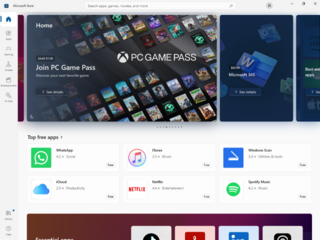Related Research Articles

iTunes is a software program that acts as a media player, media library, mobile device management utility, and the client app for the iTunes Store. Developed by Apple Inc., it is used to purchase, play, download, and organize digital multimedia, on personal computers running the macOS and Windows operating systems, and can be used to rip songs from CDs, as well as play content with the use of dynamic, smart playlists. Options for sound optimizations exist, as well as ways to wirelessly share the iTunes library.

The iTunes Store is a digital media store operated by Apple Inc. It opened on April 28, 2003, as a result of Steve Jobs' push to open a digital marketplace for music. As of April 2020, iTunes offers 60 million songs, 2.2 million apps, 25,000 TV shows, and 65,000 films. When it opened, it was the only legal digital catalog of music to offer songs from all five major record labels.

A mobile game is a video game that is typically played on a mobile phone. The term also refers to all games that are played on any portable device, including from mobile phone, tablet, PDA to handheld game console, portable media player or graphing calculator, with and without network availability. The earliest known game on a mobile phone was a Tetris variant on the Hagenuk MT-2000 device from 1994.

Apple TV is a digital media player and microconsole that is developed and marketed by Apple Inc. It is a small network appliance hardware that plays received media data such as video and audio to a television set or external display. An HDMI-compliant source device, it has to be connected to an enhanced-definition or high-definition widescreen television through an HDMI cable to function.

The App Store is an app store platform, developed and maintained by Apple Inc., for mobile apps on its iOS and iPadOS operating systems. The store allows users to browse and download approved apps developed within Apple's iOS Software Development Kit. Apps can be downloaded on the iPhone, iPod Touch, or the iPad, and some can be transferred to the Apple Watch smartwatch or 4th-generation or newer Apple TVs as extensions of iPhone apps.

Bump! is a discontinued iOS and Android mobile app that enables smartphone users to transfer contact information, photos and files between devices. In 2011, it was #8 on Apple's list of all-time most popular free iPhone apps, and by February 2013 it had been downloaded 125 million times. Its developer, Bump Technologies, shut down the service and discontinued the app on January 31, 2014, after being acquired by Google for Google Photos and Android Camera.

The App Store is a digital distribution platform for macOS apps, created and maintained by Apple Inc. The platform was announced on October 20, 2010, at Apple's "Back to the Mac" event. Apple began accepting app submissions from registered developers on November 3, 2010, in preparation for its launch.

The Amazon Appstore is an app store for the Android operating system operated by Amazon.com. It is the package app store for Amazon's Fire OS operating system, used on all of Fire tablets. The Amazon Appstore provides official apps for the Fire Tablets, instead of the Google Play app store used on other Android devices.
An app store is a type of digital distribution platform for computer software called applications, often in a mobile context. Apps provide a specific set of functions which, by definition, do not include the running of the computer itself. Complex software designed for use on a personal computer, for example, may have a related app designed for use on a mobile device. Today apps are normally designed to run on a specific operating system—such as the contemporary iOS, macOS, Windows or Android—but in the past mobile carriers had their own portals for apps and related media content.

Microsoft Store is a digital distribution platform operated by Microsoft. It started as an app store for Windows 8 and Windows Server 2012 as the primary means of distributing Universal Windows Platform apps. With Windows 10, Microsoft merged its other distribution platforms into Microsoft Store, making it a unified distribution point for apps, console games, and digital videos. Digital music was included until the end of 2017, and E-books were included until 2019.
A mobile application or app is a computer program or software application designed to run on a mobile device such as a phone, tablet, or watch. Mobile applications often stand in contrast to desktop applications which are designed to run on desktop computers, and web applications which run in mobile web browsers rather than directly on the mobile device.

OS X Mountain Lion is the ninth major release of macOS, Apple Inc.'s desktop and server operating system for Macintosh computers. OS X Mountain Lion was released on July 25, 2012, for purchase and download through Apple's Mac App Store, as part of a switch to releasing OS X versions online and every year, rather than every two years or so. Named to signify its status as a refinement of the previous OS X version, Lion, Apple's stated aims in developing Mountain Lion were to allow users to more easily manage and synchronise content between multiple Apple devices and to make the operating system more familiar.

Google Play, also branded as the Google Play Store and formerly Android Market, is a digital distribution service operated and developed by Google. It serves as the official app store for certified devices running on the Android operating system and its derivatives as well as Chrome OS, allowing users to browse and download applications developed with the Android software development kit (SDK) and published through Google. Google Play has also served as a digital media store, offering music, books, movies, and television programs. Content that has been purchased on Google Play Movies & TV and Google Play Books can be accessed on a web browser, and through the Android and iOS apps.
App store optimization (ASO) is the process of increasing an app or game’s visibility in an app store, with the objective of increasing organic app downloads. Apps are more visible when they rank highly on a wide variety of search terms, maintain a high position in the top charts, or get featured on the store. Additionally, app store optimization encompasses activities that aim to increase the conversion of app impressions into downloads.
Monument Valley is an indie puzzle game developed and published by Ustwo Games. The player leads the princess Ida through mazes of optical illusions and impossible objects while manipulating the world around her to reach various platforms. Monument Valley was developed over ten months beginning in early 2013 based on concept drawings by company artist Ken Wong. Its visual style was inspired by Japanese prints, minimalist sculpture, and indie games Windosill, Fez, and Sword & Sworcery, and was compared by critics to M. C. Escher drawings and Echochrome. The art was designed such that each frame would be worthy of public display. After a closed beta test, it was released for iOS on April 3, 2014, and was later ported to Android and Windows Phone. The game received generally favorable reviews. Critics praised its art and sound design, but noted its lack of difficulty and short length. It won a 2014 Apple Design Award, was named Apple's best iPad game of 2014, and sold over two million copies by January 2015; by May 2016, sales of the game exceeded 26 million.

FatBooth is a mobile app developed by French company PiVi & Co. Using the app, users can take photos of themselves ("selfies") or use any portrait and apply a visual effect that makes the subject appear to be overweight. It was initially released in May 2010, priced at $0.99.
Apple Arcade is a video game subscription service offered by Apple Inc. It is available through a dedicated tab of the App Store on devices running iOS 13, tvOS 13, iPadOS 13, and macOS Catalina or later. The service launched on September 19, 2019.

The popularisation of mobile games began as early as 1997 with the introduction of Snake preloaded on Nokia feature phones, demonstrating the practicality of games on these devices. Several mobile device manufacturers included preloaded games in the wake of Snake's success. In 1999, the introduction of the i-mode service in Japan allowed a wide variety of more advanced mobile games to be downloaded onto smartphones, though the service was largely limited to Japan. By the early 2000s, the technical specifications of Western handsets had also matured to the point where downloadable applications could be supported, but mainstream adoption continued to be hampered by market fragmentation between different devices, operating environments, and distributors.

Epic Games v. Apple is a lawsuit brought by Epic Games against Apple in August 2020 in the United States District Court for the Northern District of California, related to Apple's practices in the iOS App Store. Epic Games specifically had challenged Apple's restrictions on apps from having other in-app purchasing methods outside of the one offered by the App Store. Epic Games' founder Tim Sweeney had previously challenged the 30% revenue cut that Apple takes on each purchase made in the App Store, and with their game Fortnite, wanted to either bypass Apple or have Apple take less of a cut. Epic implemented changes in Fortnite intentionally on August 13, 2020, to bypass the App Store payment system, prompting Apple to block the game from the App Store and leading to Epic filing its lawsuit. Apple filed a countersuit, asserting Epic purposely breached its terms of contract with Apple to goad it into action, and defended itself from Epic's suit.

Pre-installed iOS apps, referred to in the App Store as 'Built-In Apps', are a suite of mobile applications developed by Apple Inc. which are bundled with iOS and installed by default or through a system update. Many of the default apps found on iOS have counterparts on Apple's other operating systems macOS, iPadOS, watchOS, and tvOS, which are often modified versions of or similar to the iOS application. As each app is integrated into the operating system itself, they often feature greater support for system features than third-party alternatives and are quick to adapt new features of iOS.
References
- ↑ "Neon Play's IOS Games". PC World .
- ↑ ten billionth download - Apple App Store https://www.apple.com/itunes/10-billion-app-countdown/
- ↑ Meet Neon Play, the developer behind Apple's 10 billionth download, TUAW